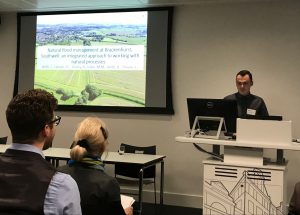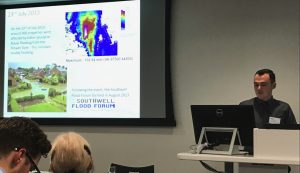Josh Well, PhD student with Dr Jillian Labadz at Nottingham Trent University, Brackenhurst campus was honoured to be invited to speak recently on the research he is conducting on Natural Flood Management. His research is being applauded internationally, putting him, Brackenhurst and flooding in Southwell firmly in the forefront of NFM evidence-based research.


The Chartered Institution of Water and Environmental Management (CIWEM) held conferences in London (31st October) and Leeds (6th December) to launch the Environment Agency’s ‘Working with Natural Processes Evidence Base’ which has been developed to help flood and coastal erosion risk management (FCERM) authorities understand, justify, develop and implement FCERM schemes with WWNP to reduce flood risk. It will also include presentations from a range of existing projects that have successfully implemented NFM measures on the ground, through effective partnerships, whilst drawing on a range of funding streams.
The UK has experienced repeated severe flooding in recent years, which has raised the profile of Natural Flood Management (NFM) creating a prominent discussion of the benefits of working more closely with natural processes to help reduce flood risk and complement more traditional engineering responses, aiming to manage and reduce flood risk in a more efficient, cost-effective and sustainable way.
Following the Pitt Review the Environment Agency defined NFM as taking action to manage fluvial and coastal flood and coastal erosion risk by protecting, restoring and emulating the natural regulating function of catchments, rivers, floodplains and the coast. Whilst this is not a new concept there has not yet been a comprehensive synthesis of the vast research undertaken on this topic, with previous research scattered and often not presented in a manner accessible to FCERM and NFM practitioners.


